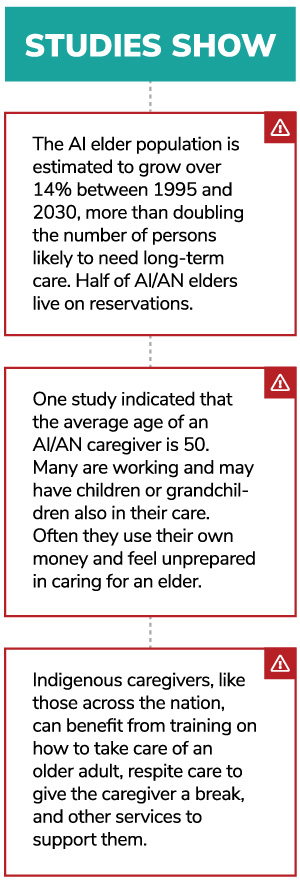For Tribal Leaders
 As our Indigenous nations continue to grow and strengthen and tribal members age, we look to our tribal leaders as protectors and leaders of our communities to take further action in addressing elder issues.
As our Indigenous nations continue to grow and strengthen and tribal members age, we look to our tribal leaders as protectors and leaders of our communities to take further action in addressing elder issues.
NICOA, made up of members representing regions across the country, have taken a stance on several issues, passing resolutions on elder abuse prevention, cuts to the Older Americans Title V Act and other topics of concern. NICOA also continues to partner in research, program development, information gathering and recommendations to state Units on Aging, Area Agencies on Aging, tribes and Congress as NICOA fulfills its mission of advocating for improved comprehensive health, social services and economic well-being for American Indian and Alaska Native (AI/AN) elders.
NICOA seeks to share education and outreach on these issues and wants tribal leaders to be aware that many caregivers do not identify themselves as caregivers and miss out on helpful supportive services that could allow them to take an occasional break to refresh and restore themselves. Such services can make a world of difference for both caregiver and the person they care for, allowing elders to remain independent in their homes.
- Like all caregivers, AI/AN caregivers when taking care of an elder appear to have significant declines in physical and psychological health, such as chronic stress and pain, depression, digestive problems, high cholesterol, and fatigue, coupled with high rates of exposure to traumatic events earlier in life.
- Many of the AI/AN caregivers appear to be on the verge of “burnout”—the inability to effectively continue to care for someone. Caregiver burnout puts the person receiving caregiving services at risk for entering a hospital or institution. Yet research shows that early community supports can help keep caregivers in that role longer.
Tribal leaders can create supportive programs and compassionate workplace policies to help them. NICOA recommends:
- Allowing flexible time schedules so a caregiver isn’t fearful of losing his or her job if an elder or family member needs longer-term caregiving
- Finding qualified free or low-cost help locally for financial issues, bill paying, money management
- Aid in finding qualified free or low-cost help for issues related to power of attorney, guardianship, wills, and other legal matters
¹ Aldrich, Nancy. 2019. “Caregiving in Indian Country: Tribes Supporting Family Traditions.” http://www.itcmi.org/wp-content/uploads/2019/01/DB-TribesSupportingFamilyTraditions.pdf
There are also several solution-oriented examples of Long-Term Services and Supports (LTSS) in Indian Country that effectively aid both the caregiver and elder to live in his or her home independently and with dignity. Some LTSS examples include:
- Adult day care
- Assisted living
- Community care – Community Health Representatives (CHR), home visitations, meals on wheels, transportation assistance
- Nursing homes
- Respite
- Senior housing
- Veteran services and housing
Through a grant from the U.S. Department of Health and Human Services’ Administration for Community Living NICOA has recently created a LTSS Compass website to serve as a resource for tribal leaders, elders, caregivers and elder program managers to aid them with this important topic. https://nicoaltsscompass.org/.
Do you have solutions in your tribal nations that you’d like to share? Please contact us.